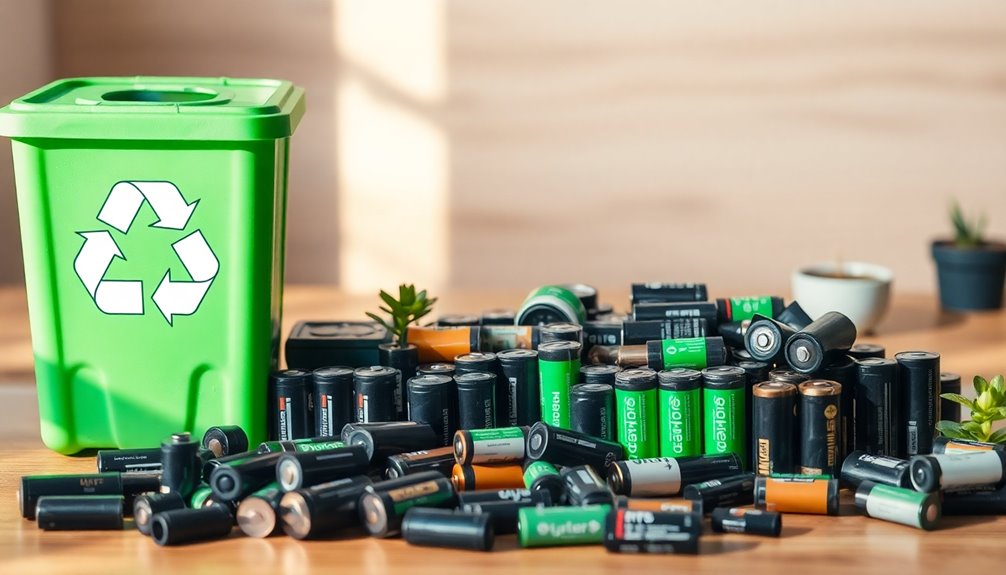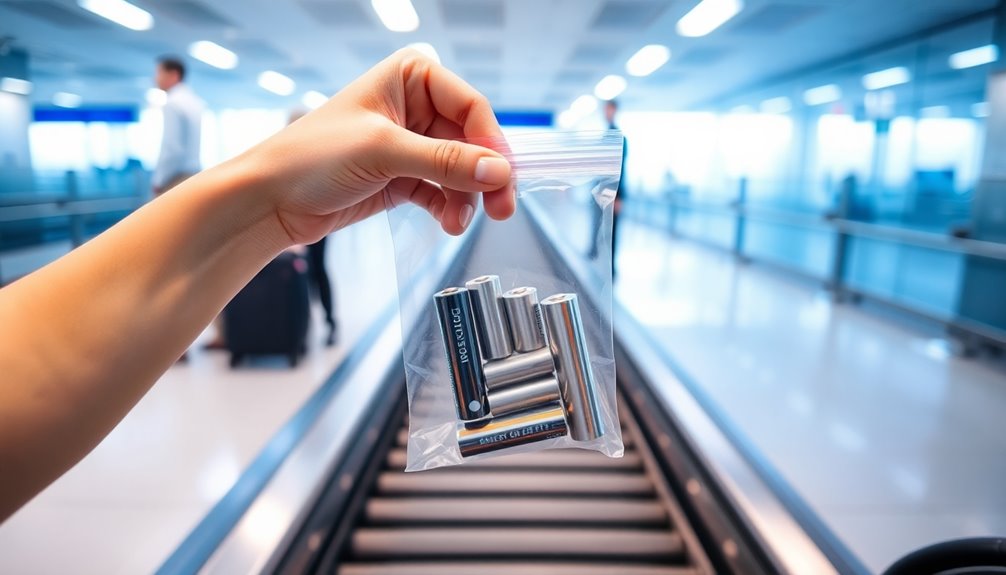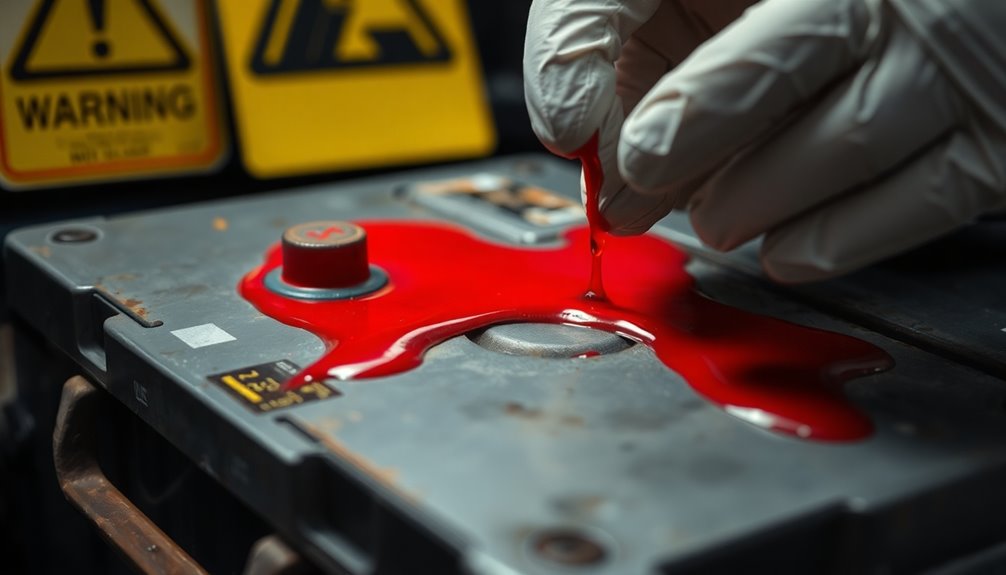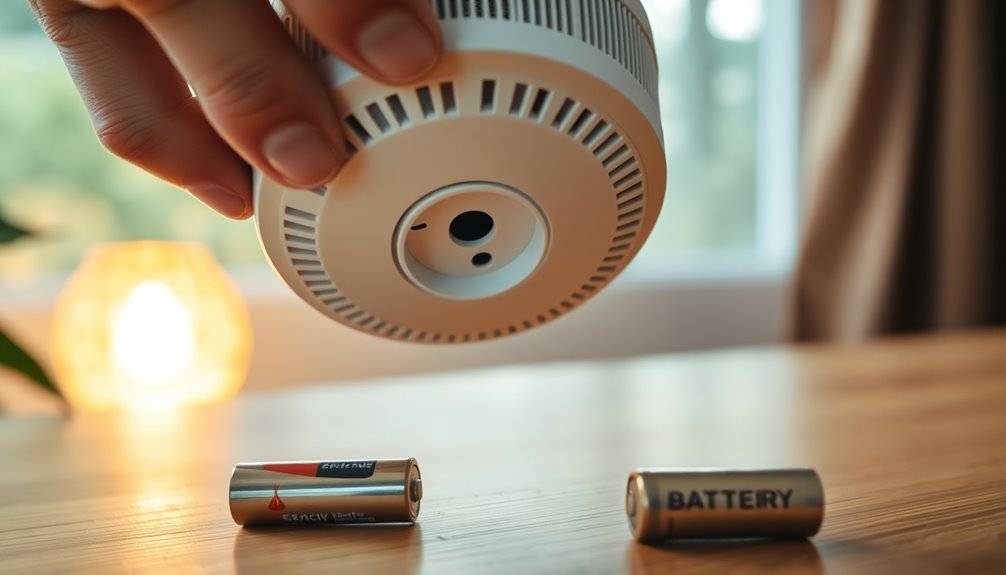To dispose of batteries safely, start by identifying the type you have—single-use, rechargeable, or automotive. Never toss rechargeable batteries or automotive batteries in the trash; take them to designated recycling centers or retailers like Home Depot. Single-use batteries can generally go in the regular trash in some places, but recycling is best, especially in California. Always store batteries in a cool, dry place and use non-conductive containers to prevent leakage. Cover terminals on 9-volt batteries with tape. To verify you're following the right guidelines, explore more about safe disposal options in your area.
Key Takeaways
- Always recycle rechargeable batteries at authorized locations to prevent hazardous materials from contaminating the environment.
- Return automotive batteries to retailers or recycling facilities; it's illegal to dispose of them in trash in Texas.
- Alkaline batteries can typically go in regular trash in small quantities, but recycling is encouraged in places like California.
- Utilize local resources like Call2Recycle.org to find nearby battery recycling programs and collection events.
- Store batteries properly in cool, dry places, and cover terminals to prevent leakage or accidental discharge.
Importance of Battery Disposal
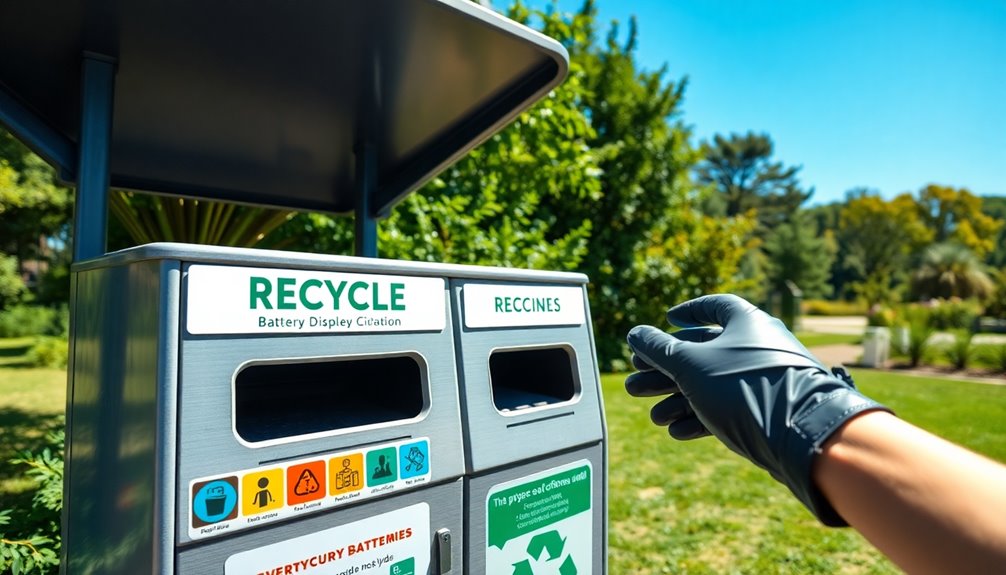
Battery disposal is essential for protecting our environment and health. Improperly disposing of batteries can release hazardous chemicals, contaminating soil and water.
With over 180,000 tons of battery waste generated annually, responsible disposal practices are critical. By recycling batteries, you recover valuable materials like lead, lithium, and nickel, reducing the need for raw material extraction and conserving our natural resources.
This process can save up to 90% of the energy required to produce new batteries, promoting sustainable practices and energy conservation. In addition, complying with local disposal regulations helps prevent toxic metals from entering landfills and water supplies, safeguarding ecosystems.
Types of Batteries
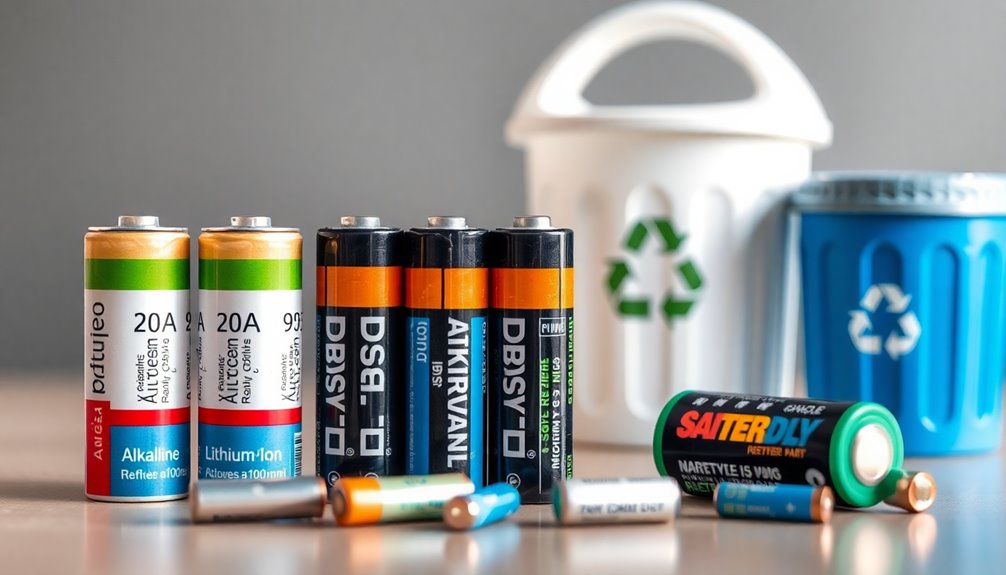
When it comes to batteries, you'll encounter different types that require specific care.
Single-use batteries power everyday devices, while rechargeable ones are designed for longevity but come with their own hazards.
Understanding these distinctions is essential for safe disposal.
Single-Use Batteries Overview
Though they may seem simple, single-use batteries come in various types that power our everyday devices. Commonly known as disposable batteries, these include AA, AAA, 9-volt, and D-cell batteries, often found in remote controls and flashlights.
Alkaline batteries, the most prevalent type, are generally considered non-hazardous and can be thrown away in small quantities, though recycling them is encouraged to reduce environmental impact.
However, button cell batteries contain hazardous materials like silver and mercury, requiring special disposal methods to prevent contamination.
With over three billion dry-cell batteries purchased annually in the U.S., understanding proper disposal and recycling methods is essential for minimizing landfill waste and protecting our environment.
Always remember to recycle batteries whenever possible!
Rechargeable Batteries Explained
While single-use batteries serve their purpose, rechargeable batteries offer a more sustainable alternative for powering your devices.
The main types of rechargeable batteries in use today include lithium-ion, nickel-cadmium, and nickel-metal hydride. Lithium-ion batteries are popular in smartphones and laptops, while nickel-cadmium batteries are often found in power tools.
However, these batteries contain hazardous materials that require proper disposal. By recharging batteries up to 1,000 times, you can considerably reduce waste and environmental impact compared to disposable options.
Utilizing recycling programs, like Call2Recycle, guarantees that valuable materials are reclaimed and toxic metals don't pollute our landfills and water supplies.
Disposal Methods
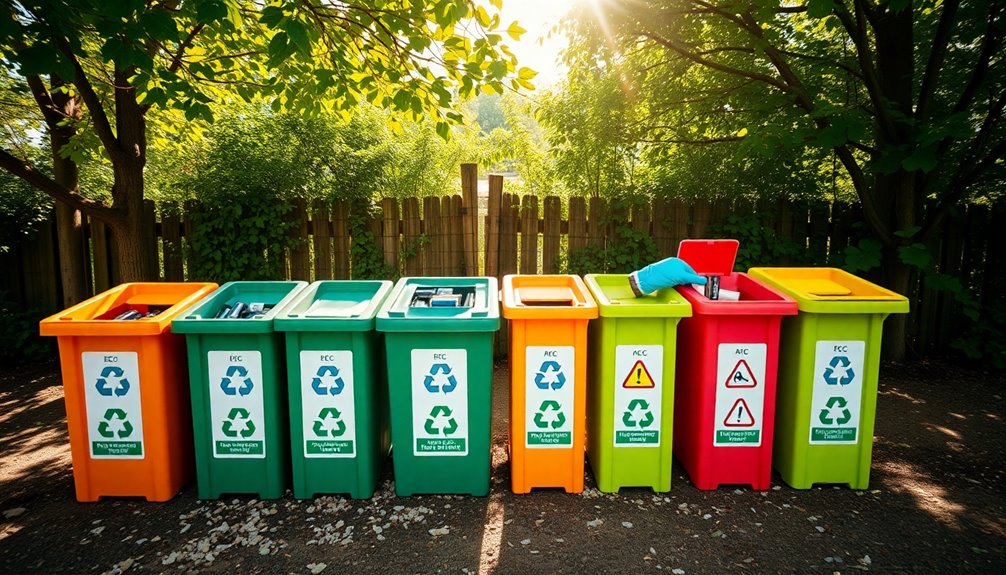
To guarantee you're disposing of batteries safely, it's important to understand the proper methods for each type.
For rechargeable batteries, never throw them in the trash; instead, locate an authorized recycling or battery recycling location.
Automotive batteries, filled with hazardous materials, must be returned to retailers or recycling facilities—it's illegal to dispose of them in trash in Texas.
Single-use batteries can usually go in regular trash, but California has stricter rules due to environmental concerns, urging recycling whenever possible.
Utilize local solid waste programs and household hazardous waste disposal options to guarantee compliance.
Some retailers, like Home Depot, offer convenient drop-off programs, making it easier for you to dispose of batteries responsibly and protect the environment.
Recycling Resources
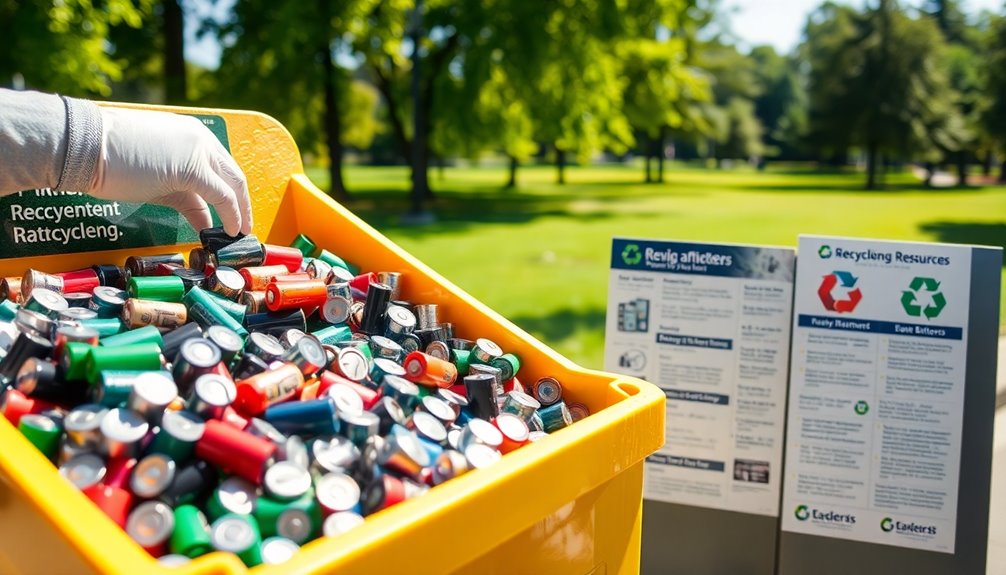
Finding the right recycling resources for batteries can make a significant difference in ensuring they're disposed of safely.
You can easily locate places to recycle household batteries and automotive batteries using various platforms.
- Call2Recycle.org: Use this tool to find battery recycling programs near you.
- Local auto parts stores: These often accept automotive batteries for safe recycling.
- Retail electronics stores: Look for battery recycling boxes that encourage environmentally friendly practices.
- Household hazardous waste programs: Check for collection events in your community to recycle batteries responsibly.
Safety Precautions
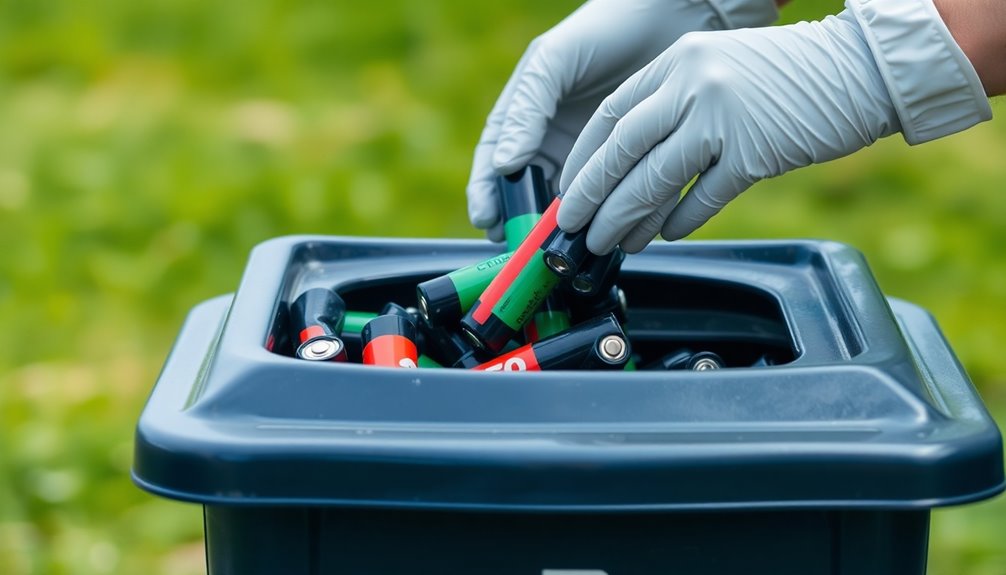
When it comes to battery safety, proper storage is key to avoiding leaks and fire hazards.
You should also handle any damaged or leaking batteries with care, wearing gloves to protect yourself from harmful substances.
Following these precautions will help guarantee a safer disposal process.
Proper Storage Techniques
Properly storing batteries is essential for safety and longevity. To minimize risks like leakage and fire hazards, follow these proper storage techniques:
- Store batteries in a cool, dry place to avoid extreme temperatures.
- Keep them in their original packaging or non-conductive containers to prevent terminals from touching.
- Cover terminals of 9-volt batteries with tape to reduce the chance of accidental discharge.
- Regularly check for signs of corrosion or leakage and dispose of any damaged batteries following recycling protocols.
Handling Hazardous Materials
Storing batteries safely is just the first step; handling them correctly is equally important to avoid potential hazards.
Always use a non-conductive container to store batteries, reducing fire hazards and leakage risks. If you need to handle damaged or leaking batteries, wear gloves to protect yourself from health risks.
Tape over the terminals of 9-volt batteries to prevent accidental short-circuiting during transport. Keep different types of batteries separate to avoid dangerous chemical reactions.
Follow your local guidelines for hazardous waste disposal to guarantee proper disposal and prevent environmental contamination.
State Regulations
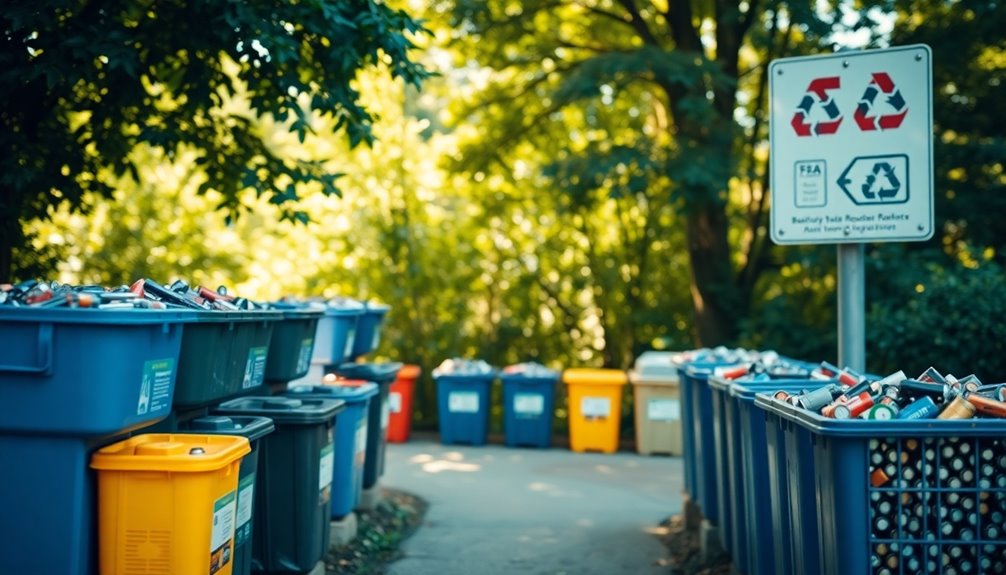
Although regulations surrounding battery disposal can differ greatly from state to state, it's crucial to know the rules that apply where you live.
Many states classify certain batteries, like rechargeable ones, as hazardous waste, making improper disposal illegal. For instance, California prohibits disposal in trash, while Texas mandates returning automotive batteries to retailers or recycling facilities.
To guarantee compliance with battery disposal regulations, consider these tips:
- Check your state-specific regulations.
- Utilize local government resources for guidance.
- Look for manufacturers' take-back programs for used batteries.
- Seek proper recycling options in your area.
Frequently Asked Questions
How Do I Dispose of AA Batteries in the US?
To dispose of AA batteries in the US, check your local regulations first.
In most states, you can toss them in the trash, but California requires special handling as hazardous waste.
Consider recycling instead, as it helps reduce landfill waste and recover materials.
Look for local battery collection programs or recycling events.
If you have 9-volt batteries, tape their terminals to prevent sparks during transport.
You can also use mail-in recycling services like Call2Recycle.
How Do I Dispose of AA Batteries in Maryland?
If you're looking to dispose of AA batteries in Maryland, you've got options!
While they're generally non-hazardous and can go in the trash, recycling's a better choice for the environment.
Check with your local waste management for recycling programs or collection events. You can also use resources like Earth911 to find nearby recycling locations.
Some retailers, like home improvement stores, often have battery collection bins for easy and responsible disposal.
Is It Safe to Put AA Batteries in the Bin?
Imagine tossing a tiny power-packed rocket into the abyss of your trash bin. It sounds harmless, but when it comes to AA batteries, caution's your best friend.
In most places, you can safely put them in the bin, but always check local rules first. In California, for example, it's a no-go.
Recycling's your best bet to keep those valuable materials from becoming landfill fodder while protecting the planet.
Can You Throw Away Batteries in Texas?
In Texas, you can't just throw away batteries in the trash. Automotive batteries must be returned to retailers or recycling facilities due to their hazardous materials.
While you can generally dispose of single-use alkaline batteries in regular trash, recycling them is better for the environment.
Button cell and rechargeable batteries require special handling, so make sure to find local recycling programs or drop-off locations to dispose of them properly.
Conclusion
In summary, disposing of batteries safely is as vital as wearing a seatbelt while driving. By understanding the importance of proper disposal, recognizing different battery types, and utilizing recycling resources, you can make a positive impact on the environment. Always remember to follow safety precautions and state regulations to keep yourself and the community safe. So, take action today—your small efforts can spark a big change for a cleaner, greener future!

